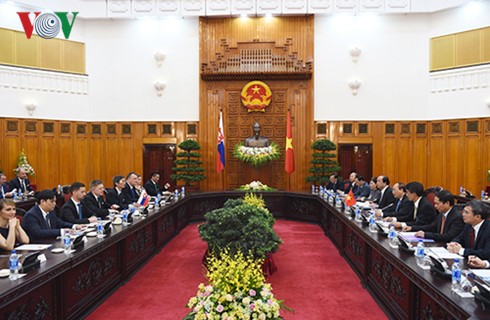(VOVworld) - Slovakian Prime Minister Robert Fico on Monday began his official visit to Vietnam at the invitation of Vietnamese Prime Minister Nguyen Xuan Phuc. This is his second Vietnam visit which is made after he was re-elected in March. His visit aims to cement traditional friendship and bilateral ties between the two countries and increase cooperation in all fields, particularly in economic, trade, investment, education and training.
 |
Prime Minister Nguyen Xuan Phuc and Prime Minister Robert Fico
|
Slovakia's territory spans about 49,000 square kilometers and it has a population of over 5 million. In 1918, the Slovaks and Czechs established the Czechoslovak Federation. Slovakia became an independent state on January 1, 1993, after the peaceful dissolution of Czechoslovakia. Slovakia is now a member of the EU, NATO, and OECD. It officially assumed the rotating post of President of the EU Council on July 1. On February 2, 1950, Vietnam and Slovakia established bilateral diplomatic relations. Last year, the two countries co-organized activities to mark the 65th anniversary of that day.
Fine traditional relations
The relationship between Vietnam and Slovakia has grown closer since 1993, when they formally created a legal framework for cooperation in the new period. So far, 15 framework agreements have been signed covering legal assistance, job training for Vietnamese citizens, health, aviation, culture, and the economy.
Trade turnover has enjoyed stable growth in recent years. Currently, Slovakia is the biggest East- Central European investor in Vietnam with 5 projects and a total registered capital of 230 million USD. It ranks 35th among the 105 nations and territories invested in Vietnam. Most of Slovakia’s projects involve construction in Hanoi, Ho Chi Minh city, and Hoa Binh province. Meanwhile, Vietnam’s FPT group signed its first mergers and acquisitions agreement to buy RWE IT Slovakia in 2014.
 |
Talks were held between the two countries' high-ranking delegations
|
Education and training cooperation is considered a primary focus of their relationship. On January 27, 1994, the two countries signed a job training agreement for Vietnamese citizens in Bratislava. They are about to sign an education and training agreement for the 2015-2019 period. Slovakia says it is ready to train technicians to operate a nuclear power plant in Vietnam. During Vietnamese President Nguyen Minh Triet’s visit to the country at the end of 2009, Slovakia included Vietnam in the list of countries it had prioritized for its ODA.
In May 2015, the two countries signed a cultural cooperation agreement for 2015-2019. Activities in Slovakia celebrating the 65th anniversary of bilateral ties include a Vietnam Culture Day and an exhibition of Vietnamese culture.
Approximately 5,000 Vietnamese are living in Slovakia. 70% of them have Slovakian citizenship or a long-term visa.
Cooperation prospects
Slovakia acknowledges Vietnam as its key partner in Southeast and East Asia. Slovakia is an EU member and Vietnam is a member of ASEAN. With its open policy and flexible economic mechanism, Vietnam can be a bridge for Slovakian goods seeking ASEAN markets. Similarly, Slovakia can help Vietnamese goods penetrate EU and other European markets.
Slovakia has well-developed support and energy industries, health, agriculture, tourism, and processing industries. These have a potential to benefit Vietnam’s industrialisation process. Meanwhile, Vietnam has high quality export products like rice, fruits, and aquatic products.
Slovakian businesses are growing more interested in the Vietnamese market and want to cooperate in many fields including energy, infrastructure, IT, and nuclear power. During his visit to Vietnam, Prime Minister Fico is accompanied by representatives of 20 businesses operating in the fields of petro-chemicals, energy, forestry, IT, finance, banking, telecommunications, and transportation who will attend a Vietnam–Slovakia Business Forum.
Vietnam and Slovakia have many opportunities to develop wide and deep bilateral ties. The documents signed and discussed during Prime Minister Fico’s visit will create a roadmap for cooperation and momentum for stronger ties.